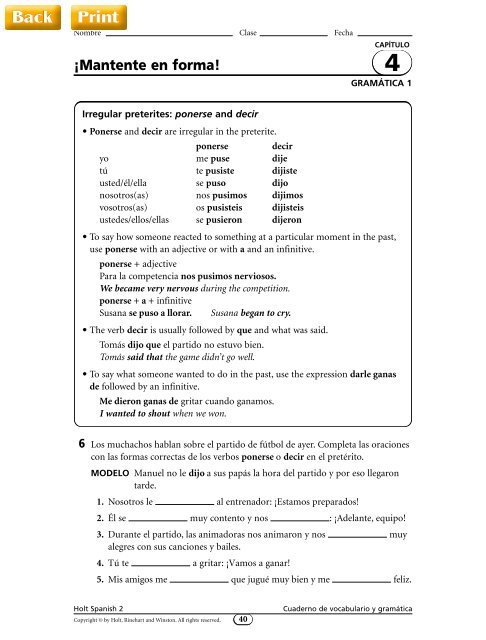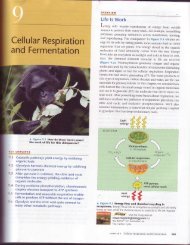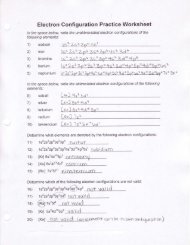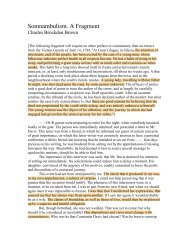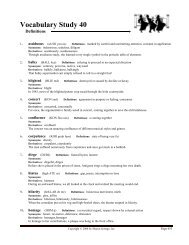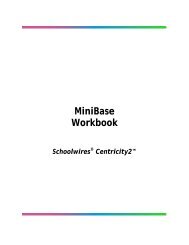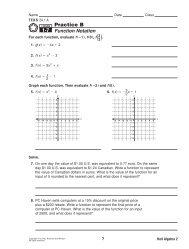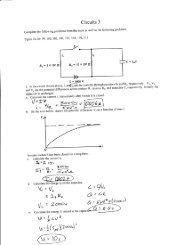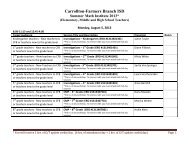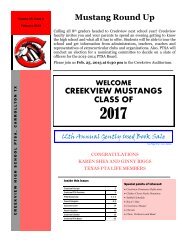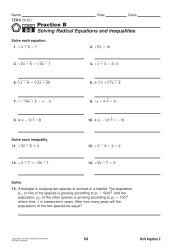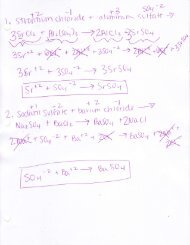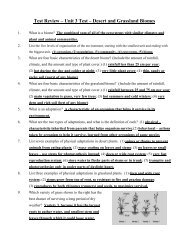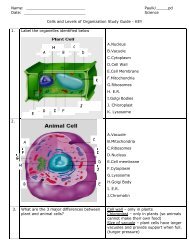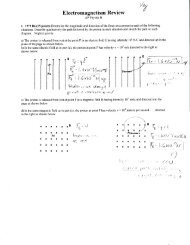¡Mantente en forma!
¡Mantente en forma!
¡Mantente en forma!
Create successful ePaper yourself
Turn your PDF publications into a flip-book with our unique Google optimized e-Paper software.
Nombre Clase Fecha<br />
<strong>¡Mant<strong>en</strong>te</strong> <strong>en</strong> <strong>forma</strong>!<br />
Irregular preterites: ponerse and decir<br />
• Ponerse and decir are irregular in the preterite.<br />
ponerse decir<br />
yo me puse dije<br />
tú te pusiste dijiste<br />
usted/él/ella se puso dijo<br />
nosotros(as) nos pusimos dijimos<br />
vosotros(as) os pusisteis dijisteis<br />
ustedes/ellos/ellas se pusieron dijeron<br />
6 Los muchachos hablan sobre el partido de fútbol de ayer. Completa las oraciones<br />
con las <strong>forma</strong>s correctas de los verbos ponerse o decir <strong>en</strong> el pretérito.<br />
MODELO Manuel no le dijo a sus papás la hora del partido y por eso llegaron<br />
tarde.<br />
1. Nosotros le al <strong>en</strong>tr<strong>en</strong>ador: ¡Estamos preparados!<br />
2. Él se muy cont<strong>en</strong>to y nos : ¡Adelante, equipo!<br />
3. Durante el partido, las animadoras nos animaron y nos muy<br />
alegres con sus canciones y bailes.<br />
4. Tú te a gritar: ¡Vamos a ganar!<br />
CAPÍTULO<br />
GRAMÁTICA 1<br />
• To say how someone reacted to something at a particular mom<strong>en</strong>t in the past,<br />
use ponerse with an adjective or with a and an infinitive.<br />
ponerse + adjective<br />
Para la compet<strong>en</strong>cia nos pusimos nerviosos.<br />
We became very nervous during the competition.<br />
ponerse + a + infinitive<br />
Susana se puso a llorar. Susana began to cry.<br />
• The verb decir is usually followed by que and what was said.<br />
Tomás dijo que el partido no estuvo bi<strong>en</strong>.<br />
Tomás said that the game didn’t go well.<br />
• To say what someone wanted to do in the past, use the expression darle ganas<br />
de followed by an infinitive.<br />
Me dieron ganas de gritar cuando ganamos.<br />
I wanted to shout wh<strong>en</strong> we won.<br />
5. Mis amigos me que jugué muy bi<strong>en</strong> y me feliz.<br />
Holt Spanish 2 Cuaderno de vocabulario y gramática<br />
Copyright © by Holt, Rinehart and Winston. All rights reserved. 40<br />
4
Nombre Clase Fecha<br />
GRAMÁTICA 1<br />
The preterite of stem-changing -ir verbs<br />
• Verbs <strong>en</strong>ding in -ir that have a stem change in the pres<strong>en</strong>t t<strong>en</strong>se also have a<br />
stem change in the preterite t<strong>en</strong>se, but only in the third-person forms.<br />
e ➔ i s<strong>en</strong>tí sintió o ➔ u dormí durmió<br />
• Some verbs that fit this pattern are s<strong>en</strong>tir(se), dormir(se) (to fall asleep),<br />
preferir, seguir, divertirse (to have fun), morirse (to die) and vestirse.<br />
7 Ana y Rosa juegan a un juego. Ana dice una oración <strong>en</strong> pres<strong>en</strong>te y Rosa la escribe<br />
<strong>en</strong> pretérito. Escribe la parte de Rosa.<br />
1. ANA: Roberto se si<strong>en</strong>te bi<strong>en</strong> después de hacer ejercicio.<br />
ROSA:<br />
2. ANA: Me duermo tarde para estudiar muy bi<strong>en</strong>.<br />
ROSA:<br />
3. ANA: Ellos se diviert<strong>en</strong> <strong>en</strong> los partidos de básquetbol.<br />
ROSA:<br />
4. ANA: Mis amigas prefier<strong>en</strong> ser animadoras que jugar <strong>en</strong> el equipo.<br />
ROSA:<br />
8 Pon las sigui<strong>en</strong>tes palabras <strong>en</strong> ord<strong>en</strong> y escribe oraciones <strong>en</strong> el pretérito.<br />
1. equipo / ganando / todo / seguir /durante / el todo / mi / año<br />
2. yo / s<strong>en</strong>tirse / cansada / <strong>en</strong>tr<strong>en</strong>ami<strong>en</strong>to / <strong>en</strong> / el<br />
3. mis amigos y yo / reírse / compet<strong>en</strong>cia / patinaje / <strong>en</strong> / la/ de / mucho<br />
4. jugadores / no / vestirse / uniforme / con / los<br />
CAPÍTULO<br />
4<br />
• Wh<strong>en</strong> seguir is followed by a gerund, it means to continue doing something.<br />
Se hizo de noche y siguió llovi<strong>en</strong>do. Night fell and it continued raining.<br />
• In the preterite, some forms of reírse have an acc<strong>en</strong>t and some don’t. Note that<br />
the acc<strong>en</strong>ted í is pronounced as a separate syllable wh<strong>en</strong> it follows the e.<br />
yo me reí nosotros(as) nos reímos<br />
tú te reíste vosotros(as) os reísteis<br />
Ud./él/ella se rió Uds./ellos/ellas se rieron<br />
Holt Spanish 2 Cuaderno de vocabulario y gramática<br />
Copyright © by Holt, Rinehart and Winston. All rights reserved. 41
Nombre Clase Fecha<br />
GRAMÁTICA 1<br />
The preterite of ser and estar<br />
• Ser and estar are irregular in the preterite. The preterite forms of ser are the<br />
same as those of ir.<br />
ser estar<br />
yo fui estuve<br />
tú fuiste estuviste<br />
Ud./él/ella fue estuvo<br />
nosotros(as) fuimos estuvimos<br />
vosotros(as) fuisteis estuvisteis<br />
Uds./ellos/ellas fueron estuvieron<br />
9 Completa la conversación <strong>en</strong>tre dos <strong>en</strong>tr<strong>en</strong>adores sobre cómo les fue a sus<br />
equipos el mes pasado. Escribe la <strong>forma</strong> correcta de ser o estar <strong>en</strong> el pretérito.<br />
—El mes pasado (1) difícil para mi equipo. Nosotros<br />
(2) de viaje muchos días.<br />
—A nosotros nos (3) bastante bi<strong>en</strong>. Ganamos una compet<strong>en</strong>cia<br />
que (4) bu<strong>en</strong>ísima.<br />
—¿Dónde (5) Uds. el fin de semana pasado? La compet<strong>en</strong>cia<br />
(6) <strong>en</strong> Texas, ¿no?<br />
—Sí. Mi equipo y yo (7) <strong>en</strong> Houston por tres días y todo<br />
(8) increíble.<br />
—Entonces, (9) todo un éxito para ti y (10) fatal<br />
para nosotros.<br />
—Bu<strong>en</strong>o, los puntajes de nuestros equipos (11) difer<strong>en</strong>tes.<br />
CAPÍTULO<br />
4<br />
• Use the preterite of ser to say where an ev<strong>en</strong>t took place, how someone did, or<br />
what someone or something was like.<br />
El debate fue <strong>en</strong> el auditorio. Fue muy difícil, y a mí no me fue bi<strong>en</strong>.<br />
The debate was in the auditorium. It was very difficult, and I didn’t do very<br />
well.<br />
• Use the preterite of estar to say what your opinion of something was, where<br />
someone or something was, or how someone felt for a period of time.<br />
¿Cómo estuvo el exam<strong>en</strong> de español? How was the Spanish exam?<br />
Estuvieron <strong>en</strong> la biblioteca todo el día. They were in the library all day.<br />
Estuve <strong>en</strong>fermo toda la semana. I was sick all week.<br />
Holt Spanish 2 Cuaderno de vocabulario y gramática<br />
Copyright © by Holt, Rinehart and Winston. All rights reserved. 42


